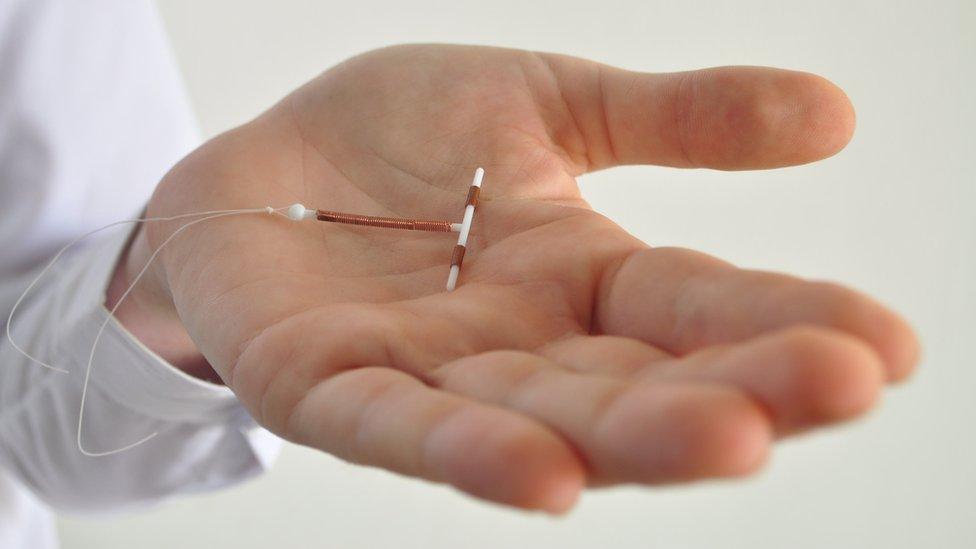Contraceptive cuts: Warning over rise in abortions
- Published
- comments

Some GPs no longer have enough funding for long-term contraceptive devices, such as the coil
Many GPs in England have stopped providing some forms of contraception because of funding cuts, the Victoria Derbyshire programme has learned.
Some clinicians have said cuts to contraceptive services will mean "more unplanned pregnancies and abortions".
The Advisory Group on Contraception's research comes after the government announced public health cuts totalling more than £800m over six years.
The government said "local areas" can best decide on sexual health provision.
Budget cuts
The AGC says one in three councils has cut, or is considering cutting the number of GP practices able to provide Long-Acting Reversible Contraception (Larc) methods, such as coils and implants.
It says the right of women to access the full range of contraceptive choices is now at risk.
Its research also suggests a quarter of councils have shut or may close some of their contraceptive services.
Most contraception is now funded from councils' public health budgets, but former Chancellor George Osborne announced in 2015 that there would be a £200m cut to public health budgets from April 2015 to April 2016.
The government then announced in its 2015 Spending Review that there would be a 3.9% year-on-year budget cut for five years,, external from April 2016 until April 2021, which totalled at least £600m., external

Contraception options
There are 15 types of contraception - condoms, combined pill, progesterone pill, implant, injection, hormonal coil, copper coil, diaphragm, cap, female condoms, patch, vaginal ring, female sterilisation, male sterilisation, fertility awareness
Long-Acting Reversible Contraception (Larc) methods include the implant, the copper coil and the hormonal coil
NICE guidelines state that Larc methods are more cost-effective than other forms of contraception
Guidelines also say women requiring contraception should be given information about, and offered a choice of all methods

Jane Dickson, an NHS sexual health consultant, says she is concerned that if funding cuts continue at the same rate, there will be an "escalation" in teenage pregnancy, unplanned pregnancy and abortion rates.
"All these new methods of contraception have been developed, which have been so much more reliable, and given women so much reproductive control. If we remove those choices again it's an enormous step backwards.
"Those great steps forward that we've made to help women plan pregnancy at a time that's convenient for them, all that work will be undone."
Service restrictions
Tracey Forsyth, a contraceptive nurse for the British Pregnancy Advisory Service, says she is "really concerned" about the direction of the NHS's contraceptive services.
"We've spent years doing really good work on contraception and sexual health.
"But now with all the cuts, what we're looking at is an increase in unwanted pregnancies."
The AGC is an advisory group made up of clinicians and advocacy groups, which makes policy recommendations on contraception.
It receives funding from the drug company Bayer, but all its members are unpaid and independent.
Its report is based on a Freedom of Information request to all 152 councils in April, to which 140 responded.
It found about 3.9 million women - about a third of women of reproductive age in England - live in an area where contraceptive services are restricted in some way.

Contraception is provided for free on the NHS
Meanwhile, a survey of 1,023 GPs by the Family Planning Association (FPA) from across England suggested:
2% offer the full range of contraceptive methods
53% do not have enough time in a standard contraceptive appointment to give women all the information they need
23% do not offer the contraceptive implant
Natika Halil, chief executive of the FPA and an AGC member, said councils are "between a rock and a hard place when faced with cuts".
She added: "It's a false economy to restrict women's access to contraception. Every £1 spent on contraception saves £11 in averted health costs.
"Making it harder for women to choose the right contraception for them will mean more unplanned pregnancies and more abortions. Councils need adequate funding to deliver the comprehensive contraceptive services women need and deserve."
'Good progress'
A spokesman for the Department of Health said: "Local areas are best placed to decide how to provide the sexual health services their communities need.
"Good progress is being made; for example, teenage pregnancy is down 30% in England since 2011 - the lowest for 40 years.
"Over the next five years we will invest more than £16bn in local government public health services."
The Victoria Derbyshire programme is broadcast on weekdays between 09:00 and 11:00 on BBC Two and the BBC News channel.
- Published19 July 2016

- Published20 October 2016
- Published23 May 2016
